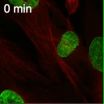Stents also problematic in acute treatment
The working paper also provides answers to further questions on the healthcare situation in Germany. According to this, there is no reason why the results of the randomized controlled trials (RCTs) already assessed, which investigated patients who received intracranial stents in non-acute situations, should not be applied to acute treatment. However, in Germany, if stents are implanted into cerebral vessels, this is mostly done in non-acute situations.
VISSIT also discontinued due to security concerns
Of the total of 4 RCTs that IQWiG analysed for the rapid report in October 2014, the SAMMPRIS study was decisive for the assessment.
The recently published VISSIT study compared the use of stents plus medical therapy versus medical therapy alone in patients with symptomatic intracranial stenosis. In contrast to the SAMMPRIS study, in which so-called wingspan stents (self-expandable stent system, SES) were inserted, the study participants in the VISSIT study received Pharos Vitesse stents (balloon-expandable stent system, BES). After publication of the SAMMPRIS results an unplanned data analysis was conducted in the VISSIT study, which was subsequently discontinued.
VISSIT results confirm SAMMPRIS results
The publication of the VISSIT results was the reason for IQWiG to examine in a working paper whether these results would challenge the conclusion of last year's rapid report. The comparison of VISSIT and SAMMPRIS clearly demonstrates: the study results agree in all important points and in both studies harm is shown through the increased risk of stroke.
This also confirms IQWiG's benefit assessment from 2014 - independent of the type of stent used. Worse results for stent therapy were shown in both studies, especially for periprocedural strokes (all strokes within 30 days after the intervention). None of the studies showed an advantage of treatment with intracranial stents.
Only few case series on acute treatment
As the SAMMPRIS study excluded patients with acute neurological symptoms (acute treatment), it was often challenged whether the results were at all applicable to the healthcare situation in Germany. This is because in this country intracranial stents are primarily used in acute situations. IQWiG also investigated this question in its working paper.
Only 6 small retrospective case series provide information on the outcomes of mortality (overall mortality) and strokes (cerebrovascular morbidity) in acute treatment (? 48 hours after a stroke) with a stent in patients with intracranial stenosis in Germany. Of the total of 31 patients in the case series, most of them with a rather poor prognosis, 13 (42%) died and 11 (35%) experienced impairment of a medium to severe degree. A favourable result was shown in 7 patients (23%).
These data are difficult to interpret due to a lack of informative comparisons. However, they provide no evidence that (intracranial) stenting in acute treatment is to be evaluated completely differently from stenting in non-acute Treatment.
RCT results applicable to acute treatment
Stefan Sauerland, Head of the Non-Drug Interventions Department at IQWiG, notes: "There is no reason why the results of the RCTs already assessed, which investigated patients in non-acute situations, should not be applied to acute treatment in Germany. Whether intracranial stents produce more benefit than harm in acute treatment can only be investigated in comparative, preferably randomized studies. Current results on the use of mechanical thrombectomy procedures in acute stroke show that such studies are possible."
Intracranial stents rarely used in acute treatment
Ten case series in Germany investigated patients with intracranial stenosis in whom stent therapy was indicated. In this context, the proportion of patients treated acutely, that is patients with a stroke within the past 48 hours, was investigated. In 40 of the overall 299 patients (about 13%, i.e. only a small proportion of patients) a stent was inserted in the context of acute treatment.
The Institute Director Jürgen Windeler summarizes: "According to these data the large majority of intracranial stents is not inserted after 1 to 2 days, but several days or weeks after a stroke." The results of the SAMMPRIS and VISSIT study are therefore of great importance for stent therapy, also in Germany.
Legislator increases requirements for medical devices
High-risk medical devices are repeatedly used in Germany, even before the benefit and harm of the intervention have been sufficiently examined. To date, information on their risks is usually obtained only belatedly due to the occurrence of specific detrimental events in patients after treatment, and unfortunately often outside the supervision of a trial.
To avoid similar problems in future as those experienced with intracranial stents, on 11 June 2015 the German Parliament decided on a change in the law: new invasive treatment procedures based on a medical device will as a rule undergo an early benefit assessment. Jürgen Windeler welcomes this change: "If this new law had already existed during the introduction of intracranial stents, the dissemination of harmful treatments could have been avoided. And thanks to high-quality studies we would know more about stents in acute treatment."
INFORMATION:
Process of report production
The present report was prepared in the form of a working paper within the framework of a general commission. To strengthen the scientific independence of the Institute, the Federal Joint Committee (G-BA) awarded a general commission to IQWiG in December 2004 and extended this commission in 2006 to cover information on the quality and efficiency of the healthcare system. This enables IQWiG to independently select topics and conduct research work. In contrast to other types of reports, there are no deadlines for the publication of working papers. The working paper was sent to the G-BA on 21 May 2015.
The working paper supplements the G-BA's commission of 28 February 2014 for a rapid report on stents for treatment of intracranial arterial stenosis. The rapid report was sent to the contracting agency on 11 September 2014.
An overview of the background, methods and further results of the working paper is provided in the following German executive summary. An English executive summary will soon be available. If you would like to be informed when this document is available, please send an e-mail to » info@iqwig.de.

